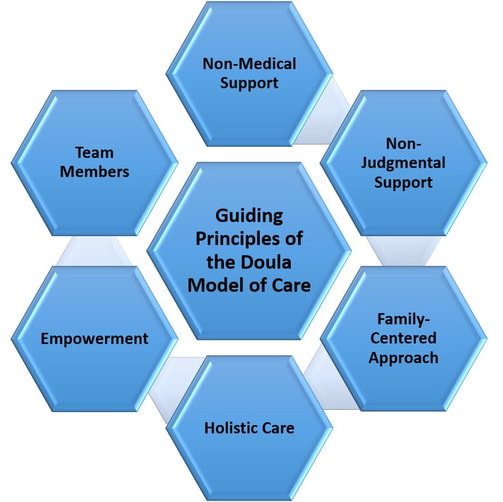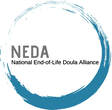The Doula Model of Care
What is the “Doula Model of Care”?
Excerpted from The Doula Business Guide: How to Succeed as a Birth, Postpartum or End-of-Life Doula, 3rd Edition, authored, by Patty Brennan (one of NEDA's "founding members)
Doulas are coming into the cultural mainstream and they are not just for birthing and postpartum mothers and their families. The emerging role of the end-of-life doula is gaining traction and helping transform how we approach end-of-life care in the United States and beyond.
Since current evidence for birth doulas is well established and based on a model of care that is gaining widespread recognition and acceptance by both consumers and medical care providers, it behooves the doula profession to unite in our understanding of the doula model of care, especially as it evolves to serve diverse needs of families throughout the lifespan.
There is plenty of room for creative visionaries to adapt the doula model of care for a target demographic or specialized care setting. Furthermore, how each doula manifests the doula model of care and delivers services to families will be uniquely her or his own. This freedom, entrepreneurship and diversity benefit the variety of individuals and families with needs that are unmet in existing systems of care delivery. At the same time, we must acknowledge what unites us as doulas and define the core, non-negotiable elements of the doula model of care.
A Model of Care broadly defines the way services are delivered. It outlines best practices for a person, population group or patient cohort as they progress through the stages of a condition or event. It aims to ensure people get the right care, at the right time, by the right team and in the right place.
Core Components of the Doula Model of Care: 6 Guiding Principles
Types of Support Provided by Doulas
To read more about the Doula Model of Care, please feel free to visit: What is the “Doula Model of Care”? by Patty Brennan
Excerpted from The Doula Business Guide: How to Succeed as a Birth, Postpartum or End-of-Life Doula, 3rd Edition, authored, by Patty Brennan (one of NEDA's "founding members)
Doulas are coming into the cultural mainstream and they are not just for birthing and postpartum mothers and their families. The emerging role of the end-of-life doula is gaining traction and helping transform how we approach end-of-life care in the United States and beyond.
Since current evidence for birth doulas is well established and based on a model of care that is gaining widespread recognition and acceptance by both consumers and medical care providers, it behooves the doula profession to unite in our understanding of the doula model of care, especially as it evolves to serve diverse needs of families throughout the lifespan.
There is plenty of room for creative visionaries to adapt the doula model of care for a target demographic or specialized care setting. Furthermore, how each doula manifests the doula model of care and delivers services to families will be uniquely her or his own. This freedom, entrepreneurship and diversity benefit the variety of individuals and families with needs that are unmet in existing systems of care delivery. At the same time, we must acknowledge what unites us as doulas and define the core, non-negotiable elements of the doula model of care.
A Model of Care broadly defines the way services are delivered. It outlines best practices for a person, population group or patient cohort as they progress through the stages of a condition or event. It aims to ensure people get the right care, at the right time, by the right team and in the right place.
Core Components of the Doula Model of Care: 6 Guiding Principles
- Non-medical support. Doulas refrain from performing any clinical or medicalized tasks.
- Non-judgmental support. The doula does not impose her/his values on the client such as acting on biases in favor of one method.
- Family-centered approach. The individual and their family form the unit of care. Doulas do not take the place of partners, family members or other care providers.
- Holistic care. Doulas recognize the biopsychosocial and spiritual aspects of the whole person and provide services in the context of this understanding.
- Empowerment. Doulas promote informed decision-making and foster maximum self-determination for the individual and family.
- Team members. Doulas are team players with a special role.
Types of Support Provided by Doulas
- Presence. Good listener, witness, calming influence, nurturing, support for troubleshooting challenges.
- Emotional support. Always part of the doula’s role.
- Information sharing. Education as needed and desired, non-biased and evidence-based.
- Proactive guidance. Anticipating needs and making a plan.
- Resources and referrals. Making referrals to appropriate community resources and care providers, thereby increasing access to all available services.
- Comfort measures and physical support. Can include hands-on comfort techniques, help with positioning, visualization, use of the breath, and so on.
- Logistical support. Can include household help, running errands, transportation to medical appointments and so on.
To read more about the Doula Model of Care, please feel free to visit: What is the “Doula Model of Care”? by Patty Brennan
|
NATIONAL END-OF-LIFE DOULA ALLIANCE (NEDA)
2423 SOUTH ORANGE AVE #115 ORLANDO, FL 32806 NEDA is a nonprofit 501c6 membership organization dedicated to supporting end-of-life doulas and the families they serve. Content on this website is for informational purposes only and is not offered as legal advice. |


